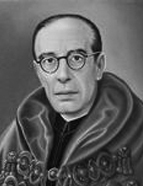

Let's start with the years between 1915 and 1923. During this period, Merêa focused particularly on the study of second scholasticism and the political and legal culture of the 16th and 17th centuries. On these topics, the following studies by the historian can be highlighted: “Desenvolvimento da Ideia de Soberania Popular nos Séculos XVI e XVII” [Development of the Idea of Popular Sovereignty in the 16th and 17th Centuries] (1915), "Suarez, Jurista. O Problema da Origem do Poder Civil” (1917), “As Teorias Políticas Medievais no " Tratado da Virtuosa Benfeitoria » [Medieval Political Theories in the Treatise on Virtuous Benefaction]” (1919), O Poder Real e as Cortes [Royal Power and the Courts] (1923), “Os Jurisconsultos Portugueses e a Doutrina do «Mare Clausum»” [Portuguese Jurisconsults and the Doctrine of ‘Mare Clausum’] (1924) and “A Cultura do Direito entre Nós” [The Culture of Law Among Us] (1925) (A. M. Hespanha, “Historiografia…”, 1982, p. 807), works currently re-edited by the Imprensa Nacional in Estudos de Filosofia Jurídica e de História das Doutrinas Políticas [Studies on Legal Philosophy and the History of Political Doctrines] (2004) and Estudos de História do Direito I. Direito Português [Studies on the History of Law I. Portuguese Law] (2007). This field of research should not be seen only as the study of the second scholasticism, but rather as the study of political doctrines, a field that Merêa considered to be neglected by Portuguese historians. This was the expression used by Paulo Merêa himself in 1919, when he wrote on the Tratado da Virtuosa Benfeitoria [Treatise on Virtuous Benefaction]: “[…] to draw attention to this inexhaustible source that is the Virtuous Benefaction and, at the same time, for to area of study that is so neglected among us: the history of our political doctrines” (Merêa, P., Estudos de Filosofia Jurídica… , 2004, p. 189). Alongside the texts mentioned above, there are two additional works from this period of Manuel Paulo Merêa's life and research, focusing on political doctrines as a whole, rather than solely on the second scholasticism: “The fair war according to Álvaro Pais” (1917) and the study on the Treatise on Virtuous Benefaction . More than this, the history of political doctrines remained present until the end of Merêa's academic life, if we consider his studies on Alexandre Herculano, “O Liberalismo de Herculano” [Herculano's Liberalism], (1941) and Rousseau, “O 'Legislador' de J.-J. Rousseau (algumas notas)” [The "Legislator" of J.-J. Rousseau (some notes)] (1967).
This work is financed by national funds through FCT - Foundation for Science and Technology, I.P, in the scope of the projects UIDB/04311/2020 and UIDP/04311/2020.
